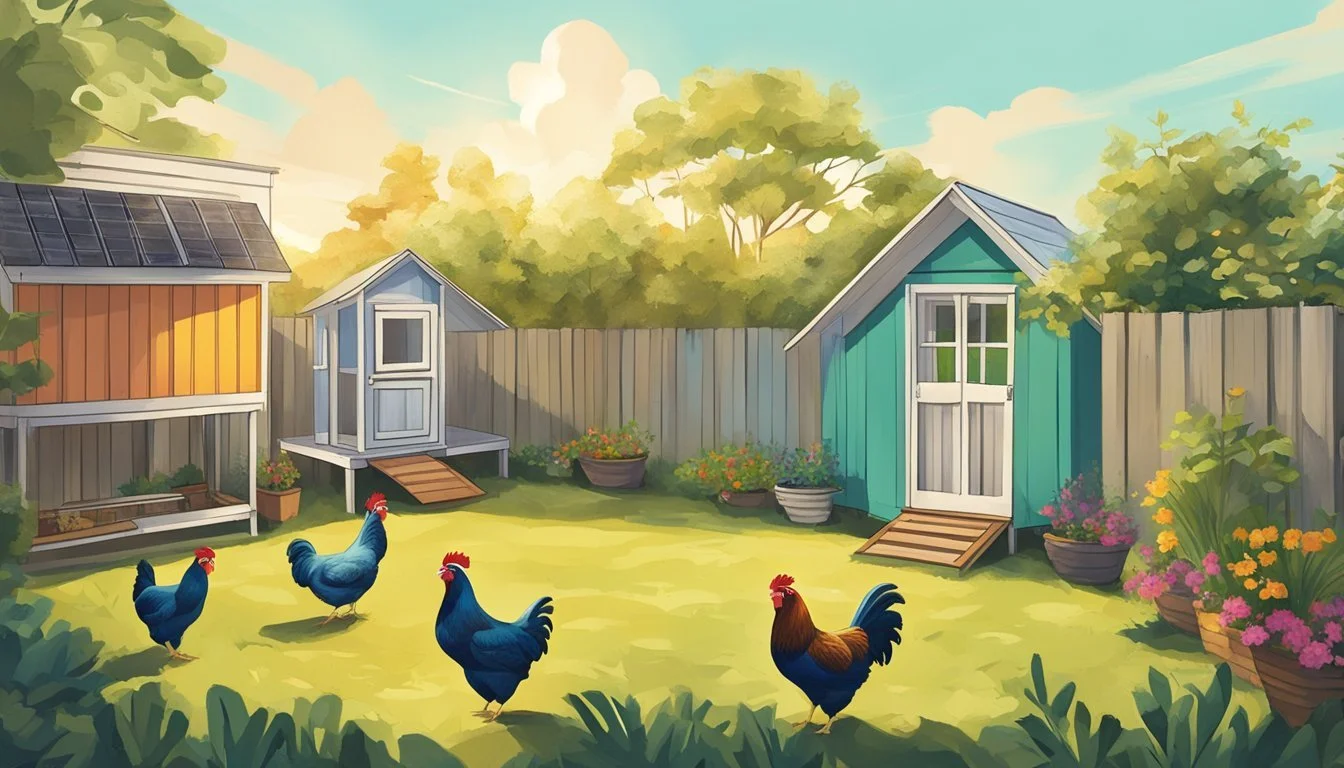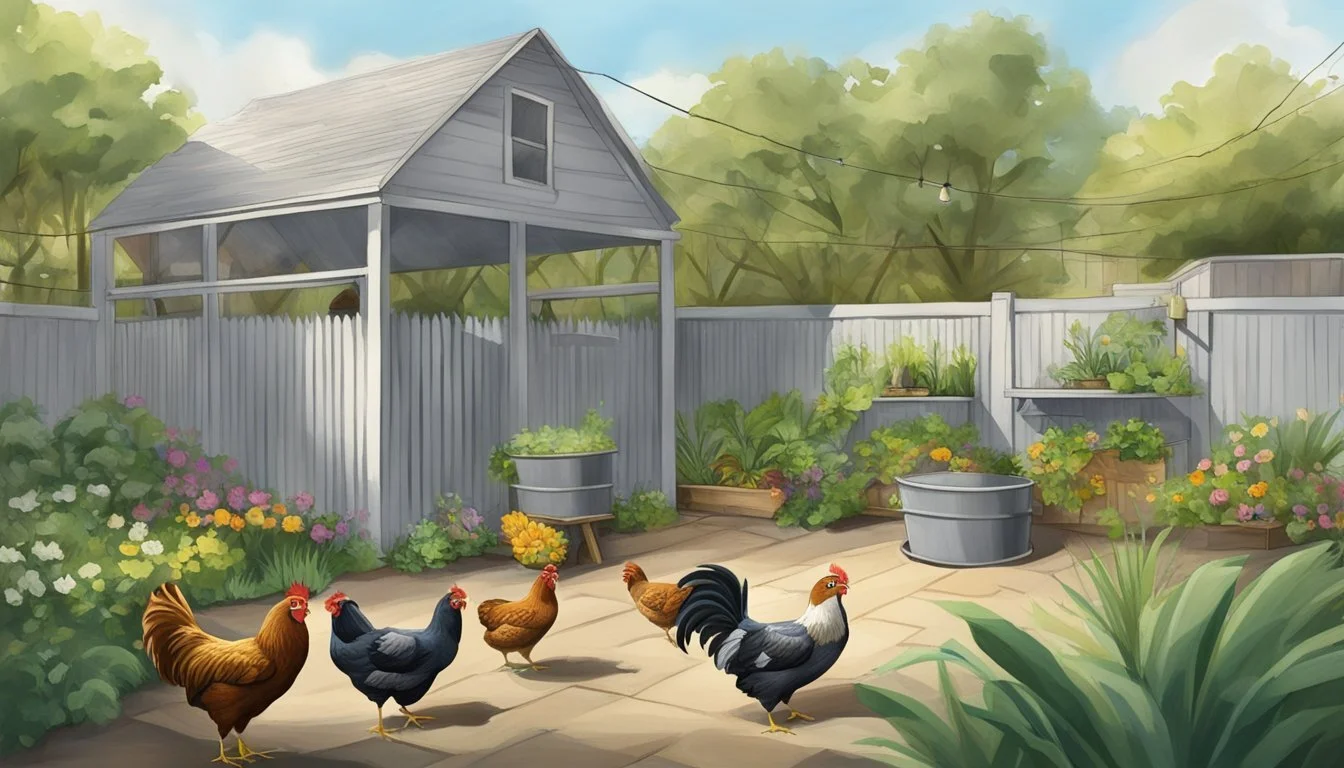Keeping Backyard Chickens in New Orleans, LA
Essential Guidelines for Urban Poultry Farming
In recent years, the movement toward sustainable living and locally sourced food has seen a rise in backyard chicken keeping, including in urban environments like New Orleans. This practice aligns with the city’s rich culinary culture and the growing preference for organic and natural food sources. Residents of New Orleans can legally keep chickens in their backyards under certain regulations. It is important for potential and current chicken owners to understand the city’s specific requirements to ensure that they are in compliance with local ordinances.
The City of New Orleans has established a set of rules that govern the keeping of backyard chickens to maintain public health and safety. Regulations include the requirement that chickens be provided with a clean, sanitary, and safe environment, along with proper food, water, and shelter. Additionally, chicken owners within the city limits are prohibited from slaughtering chickens on their property and selling eggs or meat derived from their backyard flocks.
Adhering to these regulations not only supports the welfare of the chickens but also ensures a harmonious relationship between chicken owners and their neighbors. As local ordinances can vary and change over time, it is crucial for residents to stay informed about the current laws to responsibly enjoy the benefits of raising chickens. This includes enjoying fresh eggs, which are often considered superior in taste and nutrition to store-bought options.
Legal Considerations in New Orleans
When it comes to keeping backyard chickens in New Orleans, Louisiana, residents must navigate a series of legal requirements. These include understanding local ordinances, obtaining necessary permits, adhering to regulations on the number of chickens, and following proper slaughtering protocols.
Understanding Local Zoning and Chicken Ordinances
In New Orleans, local zoning laws are pivotal as they dictate where and how residents can keep chickens. It is essential for potential chicken owners to review the zoning regulations specific to their area to ensure compliance. Chickens are generally allowed within the city limits, but understanding the nuances of the chicken laws and restrictions for one's specific zone is key.
Permit Requirements for Keeping Chickens
Residents must be aware that a permit may be required to legally keep chickens. Although some online sources suggest permits are not necessary, others indicate that the city's Department of Safety and Permits should be consulted to obtain the correct information regarding permitting requirements.
Number of Chickens and Restrictions
While some search result snippets imply there is no maximum number of chickens allowed, others specify regulations such as requiring at least 4 square feet of space per chicken. Furthermore, these rules often extend to roosters, with some indication that they are permitted in the city but must be kept a certain distance from neighboring homes. Verifying the specific number of chickens allowed and their containment requirements is important for lawful backyard chicken keeping.
Slaughtering Regulations
Slaughtering chickens may be subject to city laws and health department regulations. Chicken owners should ensure they are informed about the legal aspects and humane methods of slaughtering before proceeding. The city may have clear guidelines on whether or not backyard slaughtering is allowed and under what conditions it must be performed.
Setting Up Your Chicken Coop
When establishing a chicken coop, New Orleans residents must choose a suitable location, adhere to specific design and size guidelines, ensure robust predator-proofing, and maintain sanitary conditions for the health of the flock.
Choosing the Right Location
Selecting an optimal site within New Orleans for a chicken coop involves considering sunlight exposure, drainage, and proximity to your home. The location should receive adequate sunlight but also some shade to protect chickens from excessive heat, especially during the humid summer months. Good drainage is crucial to prevent water accumulation, which can lead to unhealthy living conditions.
Coop Design and Size Specifications
The chicken coop's design should offer at least 4 square feet of space per chicken to prevent overcrowding and promote a healthy environment. One must ensure the coop is large enough to accommodate nesting boxes, roosts, and provide ample ventilation. While New Orleans allows for backyard chickens, city regulations, such as in Metairie, Kenner, or Baton Rouge, might vary, so it's essential to verify local guidelines.
Predator-Proofing Your Coop
Predator-proofing is vital to safeguard chickens against common threats. The coop should have sturdy walls and a secure roof. All openings must be covered with hardware cloth, not chicken wire, as raccoons and other predators can breach it. It's also advisable to construct a buried perimeter of hardware cloth around the coop to deter digging predators.
Maintaining a Clean and Healthy Environment
To maintain cleanliness, coops should be cleaned regularly, with waste material composted properly. Coops must be kept dry and well-ventilated to mitigate the risk of respiratory diseases. Utilizing appropriate bedding, such as straw or wood shavings, and changing it frequently will help absorb droppings and reduce odors. Regular composting can convert chicken waste into a nutrient-rich resource for your garden, completing a sustainable cycle.
Chicken Care and Management
Proper care and management are essential for the well-being of backyard chickens in New Orleans, ensuring they remain healthy and the neighborhood stays happy.
Proper Feeding and Nutrition
Chickens require a balanced diet to maintain good health and egg production. Their nutritional needs change over time, so owners should follow a feeding schedule:
0-8 weeks old: A starter feed containing 18-20% protein.
8-14 weeks old: Transition to a starter/grower feed with 16-18% protein.
15-18 weeks old onwards: A finisher or layer feed with around 16% protein.
Always provide access to clean, fresh water.
Healthcare and Disease Prevention
The key to maintaining a flock's health is prevention. Owners should:
Practice biosecurity measures, like sanitizing tools and avoiding the spread of contaminants from one flock to another.
Vaccinate chickens against common diseases such as Marek's disease.
Have a veterinarian conduct regular health check-ups.
Routine Cleaning and Waste Management
Cleanliness is vital for preventing disease and odors:
Coops should be cleaned at least once a week; replace bedding material to control parasites and moisture.
Waste can be composted responsibly, providing an excellent source of nutrients for gardens.
Handling Noise and Neighborhood Complaints
To prevent noise complaints:
Roosters are often the cause and should be kept at least 25 feet away from neighboring homes.
Address complaints by ensuring coops are as far away from property lines as allowed.
By following these guidelines for proper feeding, health care, clean coops, and handling noise, backyard chicken owners in New Orleans can keep their flocks thriving while maintaining good relationships with their neighbors.
The Benefits of Raising Backyard Chickens
Raising backyard chickens in New Orleans, LA, offers residents the opportunity to enjoy fresh eggs and contribute to sustainable living. These benefits complement the city's vibrant community atmosphere, providing educational opportunities and fostering neighborhood engagement.
Contributions to Sustainable Living
Fresh Eggs Every Day: Residents who raise chickens in their backyards have the advantage of collecting fresh, organic eggs. The nutritional value and taste of these eggs often surpass what is available in the supermarket. Raising chickens in New Orleans allows for a direct farm-to-table experience.
Composting and Soil Health: Chicken waste is an excellent source of natural fertilizer, enriching the soil in New Orleans' gardens. Chickens also contribute to the composting process by breaking down food scraps and yard waste, which in turn promotes a healthier, more sustainable homestead.
Educational Opportunities and Community Engagement
Learning at Home: Keeping chickens serves as an interactive educational tool for families. They learn about animal care, agriculture, and responsible food production. Children and adults alike gain valuable insights into where their food comes from.
Community Events and Sharing Knowledge: In New Orleans, chickens can become a focal point for community events, such as coop tours or farmer's markets. Raising chickens encourages engagement and provides a platform for locals to share experiences and advice on sustainable living practices.
Resources and Further Reading
Knowing where to find accurate guidance and support is crucial when keeping backyard chickens in New Orleans. Below are resources particularly helpful for residents interested in or currently raising poultry in the city.
Local Workshops and Homesteading Events
In New Orleans, prospective and existing chicken keepers benefit from attending local workshops and homesteading events. These gatherings provide practical help and up-to-date knowledge tailored to the region's specific regulations and climate conditions. They often feature expert advice on topics ranging from coop construction to daily care practices. The "Press Street Gardens" has been known to host educational sessions, including workshops on raising chickens, offering participants actionable insights and plans for successful backyard poultry management.
Residents should check for event announcements on community boards, gardening centers, or alternative browsers to find information about more events and workshops, ensuring their browsers are not out of date to avoid missing online resources. These local events not only serve as a source of valuable information but also as a platform to connect with other enthusiasts and experts in the field.
Conclusion
In New Orleans, LA, residents have the opportunity to rear backyard chickens, providing a source of fresh eggs and the enjoyment of caring for poultry. However, adherence to local ordinances is crucial for harmonious urban farming. Roosters are permitted but with a required distance of 25 feet from neighboring residencies to mitigate noise concerns.
The care for chickens demands a predator-proof coop and run, ensuring a minimum of 4 square feet per chicken. This space allocation is essential for the health and welfare of the birds. It allows them to move freely, reducing stress and potential behavioral issues.
For those considering this endeavor, it's imperative to recognize that it involves more than just a love for fresh eggs. It requires commitment and an understanding of animal care. With responsible management, backyard chickens can be a joyful and rewarding experience for New Orleans residents.
Residents should view the local guidelines as a way to promote not only the well-being of their chickens but also respect for their community and environment. By following these regulations, they contribute to a sustainable lifestyle and local food production, enhancing New Orleans' rich cultural tapestry.







